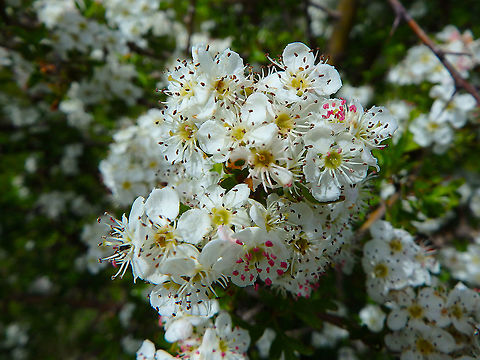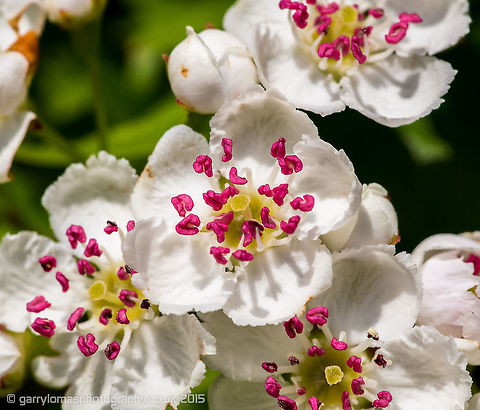
Appearance
The Common Hawthorn is a shrub or small tree 5-14 m tall, with a dense crown. The bark is dull brown with vertical orange cracks. The younger stems bear sharp thorns, 1 to 1.5 cm long. The leaves are 2-4 cm long, obovate and deeply lobed, sometimes almost to the midrib, with the lobes spreading at a wide angle. The upper surface is dark green above and paler underneath.The hermaphrodite flowers are produced in late spring in corymbs of 5-25 together; each flower is about 1 cm diameter, and has five white petals, numerous red stamens, and a single style; they are moderately fragrant. They are pollinated by midges and later in the year bear numerous "haws". The haw is a small, oval dark red fruit about 1 cm long, berry-like, but structurally a pome containing a single seed. Haws are important for wildlife in winter, particularly thrushes and waxwings; these birds eat the haws and disperse the seeds in their droppings.
It is distinguished from the related but less widespread Midland Hawthorn by its more upright growth, the leaves being deeply lobed, with spreading lobes, and in the flowers having just one style, not two or three. However they are inter-fertile and hybrids occur frequently; they are only entirely distinct in their more typical forms.

Cultural
Common Hawthorn is extensively planted as a hedge plant, especially for agricultural use. Its spines and close branching habit render it effectively stock and human proof with some basic maintenance. The traditional practice of hedge laying is most commonly practised with this species. It is a good fire wood which burns with a good heat and little smoke.Numerous hybrids exist, some of which are used as garden shrubs. The most widely used hybrid is "C. × media", of which several cultivars are known, including the very popular 'Paul's Scarlet' with dark pink double flowers. Other garden shrubs that have sometimes been suggested as possible hybrids involving the Common Hawthorn, include the Various-leaved Hawthorn of the Caucasus, which is only very occasionally found in parks and gardens.
References:
Some text fragments are auto parsed from Wikipedia.